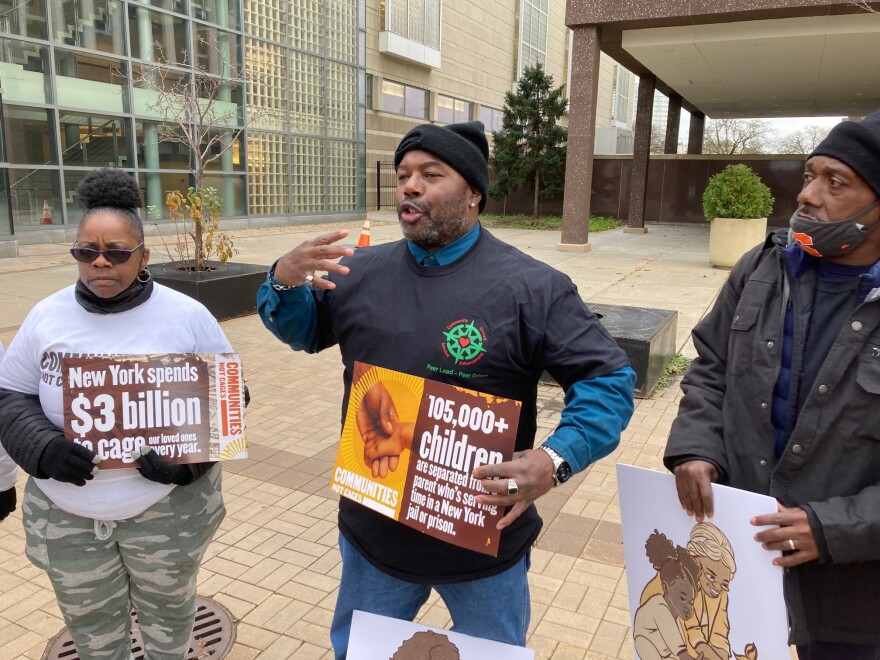Formerly incarcerated New Yorkers and their advocates gathered in Syracuse and several locations across the state Wednesday to launch a new campaign to overhaul the state’s sentencing laws. Nyatwa Bullock with the Center for Community Alternatives says “Communities Not Cages” aims to shed light on what they say are racist and draconian measures that unjustly impact black and brown communities.
"We want to stop the mass incarceration. It's costing us too much money. And, it's generational. It's happening to families. It could have been my father or my child's father."
Robert Blalock served 32 years in prison for attempted murder of a state trooper. The mandatory minimum was 20 years. He was released at age 51 in 2012.
"Keeping a person inside [prison] does more damage. The way they treat us, we come out not healed, but wounded. So, we take it back out on society because we say society is responsible for this after we do our minimum or whatever. It shouldn't be like that."
The campaign introduces new bills to eliminate mandatory minimum sentences, allow judges to reconsider excessive sentences, and the earned time act to expand “good time” and “merit time” laws (more information below).

James Miller feels he was “kicked back” to society after serving seven years. He says rehabilitation, not punishment, should be the focus of prison so inmates are ready to enter society when they’re released.
"There should be a level of where they slowly reintegrate people into society. 'OK, this guy's coming home, we're going to have a program for you to go into.' Parole ain't like that. Parole is like, 'OK, did you work yet? When are you going to get a job? You have until next month or your ass is going back up top.'"
The Center for Community Alternatives does offer re-entry programs, but they can’t reach everyone. Miller says the overall criminal justice system needs to be overhauled.
"Give me an opportunity in a system that shows they really care. 'OK Mr. Miller, you came out of prison, we're going to send you someone...not just a parole officer to put the bracelets on when you do something wrong, but someone who will come to your house, knock on your door, and say, listen, I have a job interview for you. The guy I talked to, don't worry about it. I already told him about your situation. So when you go downtown, put the application in, he will hire you.' That gives me a sense of hope."
But for so many former inmates, there is little to no hope. Most say they’re rejected by family and friends when they’re released, and often have no place to live. Many say they have PTSD and other untreated mental health issues, which they attribute to the traumas of prison.
Here's more information on the the three bills, as provided by groups including the NYCLU, Center for Community Alternatives, and others:
- Eliminate Mandatory Minimums Act: Mandatory minimum sentencing drives mass incarceration, strips judges of discretion, and grants outsized power to prosecutors to coerce guilty pleas. This bill will eliminate mandatory minimum sentences, including New York’s two- and three-strike laws, allowing judges to consider the individual factors in a case. In doing so, the Eliminate Mandatory Minimums Act will fully and finally undo the harm of the Rockefeller Drug Law era. This legislation would also create a presumption against incarceration, requiring a hearing before any period of incarceration can be imposed and re-orienting the system towards healing and accountability and away from knee-jerk prison sentences.
- Second Look Act: The Second Look Act will allow judges to review and reconsider excessive sentences. Under current sentencing laws, incarcerated people have no opportunity to demonstrate to a judge that they have transformed while incarcerated or to seek a reconsideration of their sentences based on changes in law and norms. The Second Look Act will allow incarcerated people to apply for a resentencing hearing after they have served 10 years or half of their sentence.
- Earned Time Act: Following the federal 1994 Crime Bill, New York State slashed programs for incarcerated people and dramatically limited the time people could earn time off their sentences. The Earned Time Act will strengthen and expand “good time” and “merit time” laws to encourage personal transformation in prison and reunite families.




